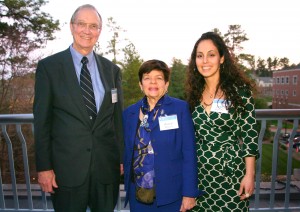Richard (“Pete”) Andrews is Professor Emeritus in the Department of Public Policy in the College of Arts and Sciences; also in the Department of City and Regional Planning and in the Department of Environmental Sciences and Engineering of the Gillings School of Global Public Health, the Environment, Ecology and Energy Program, and the UNC Institute for the Environment. In 2000 he was appointed the first Parr Fellow in Ethics of the UNC Institute for the Arts and Humanities; in 2004 he was presented the Most Outstanding Faculty Award of the Public Policy Majors Union. From 2004 to 2009 he held the first Thomas Willis Lambeth Distinguished Professorship in Public Policy, and in 2015 he was awarded the Order of the Long Leaf Pine, conferred by the Governor of North Carolina for a record of exceptional public service to the people of the state.

Professor Andrews’ research and teaching are on environmental policy in the United States and worldwide, including a book on the history of U. S. environmental policy and research grants on environmental policy innovations in the United States, the Czech Republic, and Thailand.He also directed the National Database on Environmental Management Systems, a major research initiative developed with support from the U.S Environmental Protection Agency in cooperation with the Multi-State Working Group on Environmental Management Systems (MSWG). His most recent work includes research on state policy innovations for addressing air pollution reduction, energy efficiency, renewable energy, and global climate change, and on energy behavior in business organizations.
Beyond the university, Dr. Andrews has chaired and served on study committees for the National Research Council, the Science Advisory Board of the Environmental Protection Agency, the National Academy of Public Administration, and the Office of Technology Assessment of the U.S. Congress. He twice chaired the Section on Societal Impacts of Sciences and Engineering of the American Association for the Advancement of Science, and was a member of its Committee on Science, Engineering, and Public Policy. He served two terms as a member of the NRC’s Committee on Human Dimensions of Global Change, and also served on its Panel on Addressing the Challenges of Climate Change Through the Behavioral and Social Sciences. Within North Carolina, he was principal environmental staff member for the 1984 “NC 2000” study, which was commissioned by the governor and chaired by UNC President William Friday; he also served as a member of North Carolina’s Legislative Commission on Global Climate Change.
A member of the UNC faculty since 1981, and a Carolina alumnus and parent as well as  faculty member, Professor Andrews served as Chair of the UNC Faculty from 1997 to 2000, and as chair of the Department of Public Policy from 2006 to 2011. He directed the UNC Institute for Environmental Studies for ten years, and the graduate program in environmental management and policy for a three-year term. He chaired the 1991 review committee on the university’s environmental programs and the 1995 Arts and Sciences dean review committee, as well as the faculty advisory committee of the Campus Y. He also served on the Executive Committee of the Faculty Council, and was a member of the Arts and Sciences dean search committee and of the review committee on the university’s international programs. Other campus-wide service included the Public Service Roundtable, the Carolina Society of Fellows, the director’s advisory committee for the PlayMakers Repertory Company, and the Chancellor’s committee on university-industry affairs.
faculty member, Professor Andrews served as Chair of the UNC Faculty from 1997 to 2000, and as chair of the Department of Public Policy from 2006 to 2011. He directed the UNC Institute for Environmental Studies for ten years, and the graduate program in environmental management and policy for a three-year term. He chaired the 1991 review committee on the university’s environmental programs and the 1995 Arts and Sciences dean review committee, as well as the faculty advisory committee of the Campus Y. He also served on the Executive Committee of the Faculty Council, and was a member of the Arts and Sciences dean search committee and of the review committee on the university’s international programs. Other campus-wide service included the Public Service Roundtable, the Carolina Society of Fellows, the director’s advisory committee for the PlayMakers Repertory Company, and the Chancellor’s committee on university-industry affairs.
Professor Andrews is a 1966 graduate of Yale University, and earned the Ph.D. and a professional master’s degree from UNC’s Department of City and Regional Planning. Before joining the Carolina faculty in 1981 he taught for nine years at the University of Michigan’s School of Natural Resources, and was previously a Peace Corps Volunteer and an analyst for the U. S. Office of Management and Budget. He is a Fellow of the American Association for the Advancement of Science and the National Academy of Public Administration, and a member of Sigma Xi, Delta Omega (the public health honor society), and the Association for Public Policy Analysis and Management.
